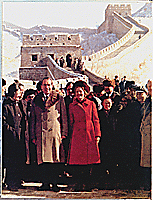| return
to Ford Library and Museum homepage |
|
Raising the Bamboo Curtain
(1972-1979)
|
| next |
|
To many the
Truman administration lost China when Mao’s Communists ousted Chiang’s
Nationalists in 1949. By the mid 1950s the United States had fought to a
standstill in Korea against the communist North. As the 1960s came to a
close America was struggling to check communist-backed insurgents in Vietnam.
America’s Pacific influence, hard won in World War II, appeared to
be waning as that of the Soviet Union’s was on the rise. |
| back |
|
| Shang
(1523-1027 BC) |
|
| Chou
(1027-221 BC) |
|
| Ch'in
(221-206 BC) |
|
| Han
(206 BC-AD 220) |
|
| Three
Kingdoms (220-581) |
|
Where others saw reasons
for pessimism, Richard Nixon saw opportunity. As Congressman and Vice President,
Nixon had built a political career as a strong anti-communist. But upon
attaining the Presidency in 1968, Nixon was willing to play the China card.
He believed he could play the interests of the USSR against those of China
to the benefit of the United States. The world was shocked when Nixon announced
in July 1971 that he would visit Peking. He made his trip the following
February and with China’s Premier Chou En-lai signed the Shanghai
communiqué. In it the two countries agreed to disagree on such hot
topics as North and South Korea, the Philippines, and Washington’s
security pact with Japan. But it included two crucial areas of understanding.
China committed itself to “a peaceful settlement of the Taiwan question,”
while the United States committed itself to oppose Soviet control in the
Asia-Pacific region. |

Courtesy National Archives and Records Administration
|
| Sui
(581-618) |
|
| T'ang
(618-907) |
|
| Sung
(907-1279) |
|
| Yüan
(1279-1368) |
|
| Ming
(1368-1644) |
|
| Ch'ing
(1644-1912) |
|
| Opening
the Door (1844-1911) |
|
| The
Period of Revolution (1912-1949) |
|
| Mao's
Dynasty (1949-1976) |
|
| Into
the Next Millennium (1979-) |
|
| |
|
| Despite this breakthrough
doubts remained about future relations. Chinese leadership, feeling the
effects of the Cultural Revolution and an aging Mao, appeared to Americans
somewhat unstable. China, watching America withdraw from Vietnam and Nixon’s
resignation, had similar thoughts. |
| Still, the bamboo curtain was rising.
President Gerald Ford visited Peking in 1975 assuring China of America’s
continued commitment to peace. Ford’s successor, Democrat Jimmy Carter,
continued Republican policy by formally establishing diplomatic relations
with China on January 1, 1979. The Peking government was recognized as the
legal representative of one China, of which Taiwan was a part. |
